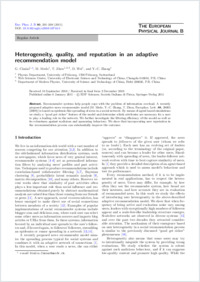Heterogeneity, quality, and reputation in an adaptive recommendation model
- Cimini, Giulio Physics Department, University of Fribourg, Switzerland
- Medo, Matúš Physics Department, University of Fribourg, Switzerland
- Zhou, Tao Physics Department, University of Fribourg, Switzerland - Web Sciences Center, University of Electronic Science and Technology of China, Chengdu, China - Department of Modern Physics, University of Science and Technology of China, Hefei, China
- Wei, Dong Physics Department, University of Fribourg, Switzerland
- Zhang, Yi-Cheng Physics Department, University of Fribourg, Switzerland
-
06.01.2011
Published in:
- The European Physical Journal B - Condensed Matter and Complex Systems. - 2011, vol. 80, no. 2, p. 201-208
English
Recommender systems help people cope with the problem of information overload. A recently proposed adaptive news recommender model [M. Medo, Y.-C. Zhang, T. Zhou, Europhys. Lett. 88, 38005 (2009)] is based on epidemic-like spreading of news in a social network. By means of agent-based simulations we study a “good get richer” feature of the model and determine which attributes are necessary for a user to play a leading role in the network. We further investigate the filtering efficiency of the model as well as its robustness against malicious and spamming behaviour. We show that incorporating user reputation in the recommendation process can substantially improve the outcome.
- Faculty
- Faculté des sciences et de médecine
- Department
- Département de Physique
- Language
-
- English
- Classification
- Physics
- License
- License undefined
- Identifiers
-
- RERO DOC 27342
- DOI 10.1140/epjb/e2010-10716-5
- Persistent URL
- https://folia.unifr.ch/unifr/documents/302165
Statistics
Document views: 75
File downloads:
- 10051_2010_Article_9985.pdf: 132
